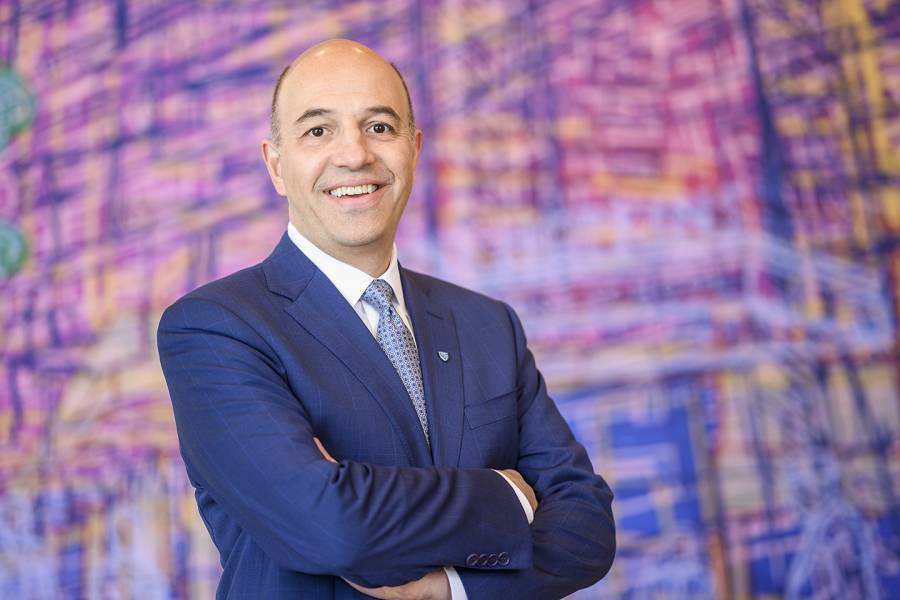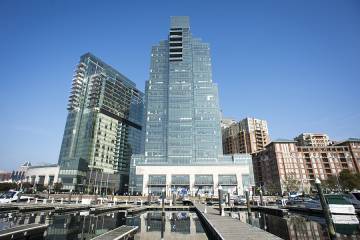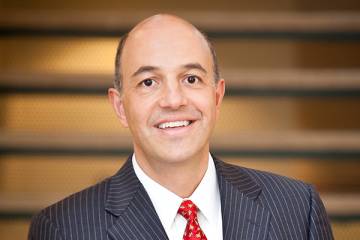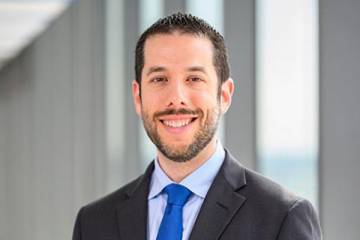With a revamped curriculum for its full-time MBA program and under the leadership of a new dean, the Carey Business School at Johns Hopkins University is poised to build on the growth and success that marked its first decade.
Starting this fall, the two-year, full-time MBA program will offer two pathways for academic concentration: one focused on in-demand analytics and data skills and one that leverages Hopkins' expertise in biotechnology and medicine to train students for health-related fields. With the support of a new $25 million gift from the W. P. Carey Foundation announced this week, the school will also expand its career development services to better prepare students for a competitive job market.
Also new to the business school is its dean, Alexander Triantis, who joined Carey in August after serving as dean of the Robert H. Smith School of Business at the University of Maryland for six years.
"It's been great following in the footsteps of [Dean emeritus] Bernie Ferrari," Triantis says. "He and I still talk on occasion so that I can bounce ideas off him and learn from what he's done in the past."
Carey alum Jack Hirsch reached out to Triantis for a wide-ranging conversation about the changes to the MBA curriculum and the new dean's vision for the school. A member of the school's inaugural full-time MBA Class of 2012, Hirsch is senior director of product management at Box, a cloud content management and file sharing company based in Silicon Valley.
Hirsch and Triantis discussed how Carey remains competitive among its peers in an era when business school applications are down, how Carey graduates are being trained in more high-demand and practical skills, and how, despite these changes, Carey's mission to promote "Business with Humanity in Mind" remains a central part of the school's DNA.
Hirsch: What are the nature of the changes made to the full-time MBA program, and how were those decisions made?
Triantis: There was a thorough process that took place over the last couple of years that involved taking a fresh look at what the full-time MBA should look like in light of changing trends in the marketplace in a variety of different industries. For instance, as part of this effort, a number of employers were surveyed and focus groups were held with potential students, and through that market research it became clear that in order to be competitive in the MBA market and to be forward-looking, the school should try to revise its MBA curriculum.
I can tell you a few key items that I think are highly relevant that emerged from that effort. One is, analytics has become much more important to employers. We now have a collection of five new analytics courses, including a course in artificial intelligence, that are all going to be requirements of the core curriculum. But at the same time, the employers also really emphasized the importance of power skills—or soft skills, as we sometimes call them—things like leadership, negotiation, team building, communications, and change management. We've tried to make sure that we have the best courses in those areas and weave together the analytics side together with the power skills. That's one key underlying concept.
Also of note: We decided on two pathways for the curriculum, so students can follow a more general Analytics, Leadership, and Innovation pathway or a Health, Technology, and Innovation pathway that leverages the strengths of being at Hopkins and having the reputation and visibility in the area of health and also having great resources at our disposal.
I would also add that we've really doubled down on experiential learning, because we know that's an important part of how our students learn and is a memorable part of the program for alumni. We also think that mentoring and coaching is extremely important. So, we've put together almost like a personal board of advisers for each student that would combine a faculty member, somebody from our Career Development office, and an alumnus industry leader who would work together not only with the students on a one-on-one basis but also as a team to help our students chart a career path.
Speaking from personal experience, the Innovation for Humanity projects and the Discovery to Market projects that I and my classmates were a part of were probably some of the most meaningful and impactful things that happened during my time at Carey. What is happening with the experiential learning opportunities at Carey in both the full-time and part-time programs?
I'll start with the full-time MBA because that's been our first wave of trying to refresh the program. There have been slight changes to what we had, but we're also adding more experiential learning opportunities. For instance, Innovation for Humanity is actually renamed the Innovation Field Project, and it will allow a little bit more flexibility. Although it won't necessarily require a global opportunity, we have other global opportunities made available to the students and it will allow for any innovative opportunities, including those here in the United States. The key thing is that the students will be working with a company or an organization for a long period of time and have a visit for three weeks, as with the former Innovation for Humanity Project setup, for students to do a deep dive and to understand cultural differences in the organizations and so on. The heart of the project is still there.
Also, Discovery to Market is still going to be there and we're going to have health-focused Discovery to Market opportunities for those folks in the Health, Technology, and Innovation pathway.
We've also added a big data consulting project. We want our students to learn the analytic skills of working with big data, but also to do it in the context of real companies that have problems to solve through data analysis. That will be, I think, a great new opportunity in this program. We've already started to talk to a number of companies and alumni who are interested in sponsoring these types of projects to really give students a deep dive.
We also have a leadership development expedition in Belize and Norway, and those are really transformative experiences for students, and not only for our full-time MBA students but also some of our Flex MBA students as well. And we're going to give students in their second year some choice in terms of the experiential opportunities they want to take advantage of.
Coming from Silicon Valley, where obviously data and scale are important, I'm interested in what those beginning consulting projects look like and what Carey MBAs can offer a company with a lot of data, a lot of questions, and a lot of challenges.
We are still picking the clients, so I don't have any concrete examples to give quite yet. But, the idea would be that a company says 'we've got this data'—let's say it's data about their customers or a potential new market—'and we're looking to get a recommendation.' Our students will be very focused not simply on the analytics part but also on understanding how to scope a project, the insights they gain from the data, and the recommendations they can make for the company. It's meant to be a holistic opportunity where students work as consultants for the company. They will do this project in the spring of their first year, and by that point they will already have mastered to some extent the skills that they'll need.
So they get to flex both their quantitative and qualitative muscles through the process?
Exactly, weave the two together.
You mentioned the course on artificial intelligence. Why is now the time to require courses in AI, and what will the course be so that it doesn't just pander to the buzzwords?
That's a great question. I think there are three or four key elements that hopefully will be part of that course. First of all, I think it's important to understand what artificial intelligence is. What are these tools? When people talk about machine learning, I think our students should know, roughly, what that means and understand what the powers and the limitations are of these techniques. The second is understanding what AI can enable across different industries. What is the potential of AI? Obviously we're not going to make our students experts in AI, but we want them to know what tools are available on a broad level and what they're capable of doing.
Finally, I think really important is understanding some of the, for lack of a better phrase, societal issues that surround AI. Issues related to privacy or to bias, for example, that have really started to shape the conversation about how we should or shouldn't be using AI in different contexts. Or how customers or employers react to and change their behaviors as a result of AI. There will be maybe what I would call the softer side of understanding the power of limitations of AI.
I've tried to hire Carey MBA grads, both successfully and unsuccessfully, and one of the biggest challenges that I've seen is the focus on the concept and theory of these tools with less emphasis on basic tool familiarity. Especially here in Silicon Valley, we have this incredible bias toward action and the need to actually get things moving. How much emphasis will be on tool familiarity and actual experience using them, versus understanding the concepts, powers, limitations, and societal impact?
My understanding is that it will involve actually working through a problem or problems using the tools themselves. We have a limited amount of time, so we're not going to make them experts, but it's important for them to have actually used the tool and understand how it works so they are able to work together on a team with folks who may have even deeper expertise.
You mentioned renaming 'Innovation for Humanity' to 'Innovation Field Projects.' Where has 'Business With Humanity in Mind' gone? That mission was a pretty key differentiator for me.
I would say that it hasn't gone anywhere. I think it's become an important part of the fabric of the school and even though I've joined just recently, I can definitely see plenty of evidence of that.
Part of the exercise over the last couple of years of trying to figure out what's next for Carey Business School and for the full-time MBA program was that a set of four values were introduced and one of them is unwavering humanity—it's critical that our students understand the positive ways business can affect society and that they understand the flip side of that, the areas of weakness where business may be impacting society negatively. It's important for our whole community of students, faculty, staff, and alumni to actually be involved in our community.
So while the names may have shifted, the spirit hasn't waned in any way. It's still very much an important part of our DNA.
One of the things that I've seen separate top business school grads from others is how well the schools they originated from have fostered a culture of entrepreneurship both inside the program but also in the local community. Where do you see Carey going in terms of investing in the entrepreneurial spirit of the school and the local community?
That's a great question. First of all, I'd say that the university overall has invested more time and financial resources to focus on entrepreneurial opportunities for their students, as well as for all the PhD students and faculty who are involved in entrepreneurship. A key piece of that is Johns Hopkins Technology Ventures. There are resources at the university level that the Carey community can fit nicely together with.
Within the business school, part of what we have to do is focus on the experiential courses we were talking about before and making sure that we are connecting with the startup community. I didn't mention this earlier, but we've also included a new design thinking course that will be a required part of the new full-time MBA program and will be tied together with some of the experiential opportunities.
We are also hosting what's called the Big Idea CONNECTpreneur Conference, which is a local conference that moves around within the larger capitol region. We'll be bringing in a lot of entrepreneurs, venture capitalists, and angel investors, and that will be a great way to introduce some of them who don't already know the Carey Business School to what we're doing, and hopefully that will help us build long-term relationships.
I have to ask you a question I'm sure you hear quite a bit. We all know that MBA applications are on the decline and have been for a while. What is Carey—a startup business school with less brand recognition—doing to stand out from the crowd of business schools?
Yes. I do hear that question a lot, and I think there are a variety of different factors contributing to that trend.
The first thing we often hear is that when an economy is strong, the application flow slows down or declines for full-time MBAs because the opportunity cost of walking away from a good job and opportunities to grow in that career for a couple of years is too high. We can't really control that, and we like the fact that the economy is strong, so we'll leave that as it is.
But one thing we can control is the relevance of the curriculum. That really underpins what we did over the last couple of years, of determining whether we have the most relevant, forward-looking curriculum. And I think with the changes we made, we do. At this point we just have to get the word out. And you said—being a relatively new business school, we have to work a little bit harder on the marketing side to make sure we spread the word.
Another issue is the cost of the MBA, and we've continued to put more resources into financial aid to make sure that it is an accessible program.
The last factor I'll mention is flexibility. I think that students are increasingly looking for more flexibility in how they go through programs. We've seen over the last few years a real increase in online programs, including online MBAs. At Carey, we have a very distinct type of degree for working professionals called the Flex MBA, which allows students to take classes in-person in a classroom or online. You can decide how it works best for you, and it doesn't have to be a pure onsite or pure online program. It can be a hybrid, which we think maximizes the flexibility for our students.
What is changing on the career development front?
There are a couple of key components. One is preparing our students to present themselves to the job market in the best possible way. As an example, that personal board of advisers that I mentioned before is focused on precisely that—having the career development office work together with faculty and alumni industry leaders to really make sure that they are prepared for when they get their interviews.
The second part is helping connect students to potential opportunities in the job market. A big part of that for any business school is making sure we develop relationships with our alumni and ask for their help in letting students know where there are job opportunities.
It's also important for us as a business school to be as well connected to as many companies in different industries as possible. There are a lot of efforts underway, in terms of our corporate relations activities, starting with developing relationships with companies that are close by and meeting with alumni to tell them more about our programs and what students are being developed to do. A lot of it is just getting out and communicating with as many companies as possible and in diverse industries so that it's not simply geographically concentrated in Baltimore and D.C., where many of our students do want to work, but also in Silicon Valley where you are, and globally, because frankly some of our international students are looking to go back and work in their country of origin.
What was it about Carey that made you want to join it as dean?
I saw a school that was relatively young. That it was entrepreneurial, that it was agile and really wanted to make a difference, not only in business but in business' impact on society.
Now, here I should note that Hopkins overall is very focused on working together across different schools—the One Hopkins mission of the institution. That concept really appealed to me to work more closely together so business is not just a silo, but really works together in bilateral or multilateral ways with other schools. The school already has a strong footprint in the area of health, and with the enormous innovations going on in health care and in medical devices and so on, it seemed like a great opportunity to continue to magnify the school's visibility in the health industry and, for me, to be part of that.
Posted in University News, Voices+Opinion











